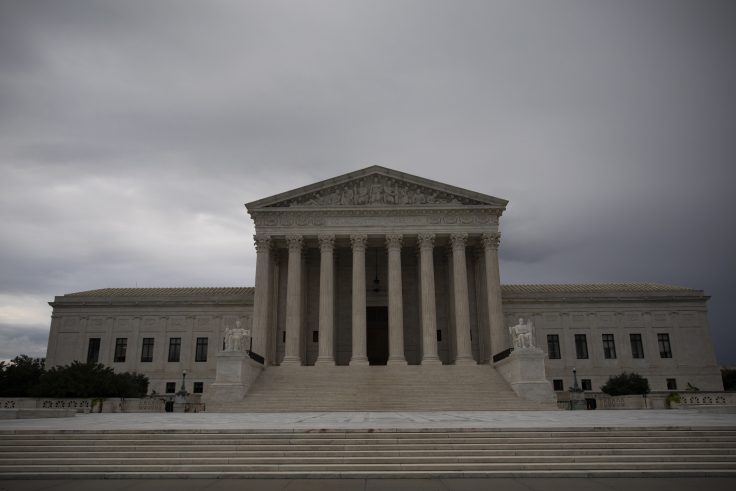The Supreme Court on Monday struck down a Louisiana law that providers say will leave the state with just one abortion clinic, in a decision that may deescalate abortion disputes ahead of the 2020 election.
Justice Stephen Breyer delivered the decision for a 5-4 Court, with Chief Justice John Roberts joining the liberals only in the bottom line judgment. All four conservative justices wrote separate dissents. The ruling is the Court’s first abortion case with President Donald Trump’s two appointees on the bench.
The contested law, called Act 620, requires that any Louisiana abortion provider have admitting privileges at a nearby hospital. The law will nottake effect following Monday’sdecision.
The case is widely seen as an early tell for how the Supreme Court will approach abortion with a Roe-skeptic majority seemingly in place. Monday’sdecision, which resembles a 2016 case involving a similar Texas law, is a defeat for pro-life activists who hoped Justice Anthony Kennedy’s retirement would prompt an immediate rupture with the Court’s pro-abortion jurisprudence. It also suggests that anti-abortion lawmakers around the country made a strategic misstep in quickly enacting new restrictions on the procedure, now contested in lower federal courts. Monday’sruling follows a sweeping victory for LGBT rights on June 15, and comes as surveys show President Trump’s support slipping with evangelicals.
Monday’s dispute closely resembles a 2016 Supreme Court case called Whole Women’s Health v. Hellerstedt. That case involved a Texas law which similarly required that providers obtain admitting privileges at a hospital within a 30-mile radius, among other requirements. Pro-choice groups said the law was a stealth-measure meant to shutter abortion clinics by imposing needless regulations. An eight-member Court struck down the Texas law 5-3, saying it imposed huge regulatory burdens on providers with comparatively few benefits for women.
The stakes are similar in Louisiana, according to pro-choice groups. There are just three abortion clinics in the state, which together terminate about 10,000 pregnancies each year. Providers at two of those clinics said they are unable to comply with Act 620’s requirements, which would leave just one clinic to service the entire state.
The Fifth U.S. Circuit Court of Appeals found reason to question that assertion. Writing for a three-judge panel that upheld Louisiana’s law 2-1, Judge Jerry Smith said many providers “largely sat on their hands, assuming that they would not qualify,” thus bolstering their legal challenge.
“There is insufficient evidence to conclude that, had the doctors put forth a good-faith effort to comply with Act 620, they would have been unable to obtain privileges,” Smith wrote. Any burdens the law creates, the panel said, are minimal.
Breyer disagreed. He said the providers made sound efforts to obtain admitting privileges but were denied for reasons unrelated to safety or skill. For example, he noted that some hospitals categorically refuse to extend admitting privileges to abortion providers.
Indeed, Breyer said that the evidence in Monday’s case mirrors “Whole Woman’s Health in every relevant respect and requires the same result.” As in the Texas case, he said Louisiana’s law imposed heavy burdens with sparse benefits.
Louisiana argued that the law promotes quality healthcare, since the privileges rule serves as a kind of vetting process that ensures physician competence. Breyer’s four-justice opinion said the requirement is not a useful test of ability.
“Hospitals can, and do, deny admitting privileges for reasons unrelated to a doctor’s ability safely to perform abortions,” Breyer wrote.
While the benefits are few, Breyer wrote, the burdens are many. He agreed the law would leave Louisiana with a single abortion clinic, located in New Orleans. That would seriously limit abortion access, he wrote, citing the possibility of long wait times and increased driving distances. That hurdle, Breyer said, is compounded by the fact that women in Louisiana must undergo counseling and an ultrasound at least 24 hours before the procedure. That being so, patients in northwest Louisiana would have to travel the length of the state to New Orleans in order to terminate a pregnancy if Act 620 took effect. That would meaning burning 20 hours in the car over several days, or staying overnight in New Orleans.
“The burdens of this increased travel would fall disproportionately on poor women, who are least able to absorb them,” Breyer wrote.
Justices Ruth Bader Ginsburg, Sonia Sotomayor, and Elena Kagan joined Breyer’s plurality opinion.
Roberts did not agree with Breyer’s reasoning. Instead, he handed down a solo opinion arguing that the Louisiana law was practically a carbon copy of the Texas rules struck down in Whole Women’s Health, and should be struck down on the legal principle that courts must follow their precedents.
“Stare decisis instructs us to treat like cases alike,” Roberts wrote. “The result in this case is controlled by our decision four years ago invalidating a nearly identical Texas law. The Louisiana law burdens women seeking previability abortions to the same extent as the Texas law.”
The Trump administration supported the Louisiana law before the High Court. Enforcement of Act 620 has been on hold since 2019, when a 5-4 Court halted enforcement while litigation continues.
The case is No. 18-1323 June Medical Services v. Russo.
Via FreeBeacon


